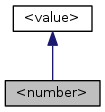|
| number | abs () |
| | Returns the absolute value of the number. More...
|
| |
| string | format (string fmt) |
| | Returns a string of a formatted number according to a format string. More...
|
| |
| bool | infp () |
| | Returns True if the number is infinity (+ or -) More...
|
| |
| bool | intp () |
| | Returns True because number values can be converted to integers. More...
|
| |
| bool | nanp () |
| | Returns True if the number is NaN (not a number) More...
|
| |
| int | prec () |
| | Returns the precision of the current number. More...
|
| |
| int | sign () |
| | Returns -1 if the number is negative, 0 if it is zero, or 1 if it is positive. More...
|
| |
| bool | strp () |
| | Returns True because number values can be converted to strings. More...
|
| |
| string | toString (int fmt) |
| | Returns the string representation of the number according to the format argument. More...
|
| |
| int | typeCode () |
| | Returns Qore::NT_NUMBER. More...
|
| |
| bool | val () |
| | Returns True if the number is non-zero, False if zero. More...
|
| |
| bool | callp () |
| | Returns False; this method is reimplemented in other types and will return True if the given expression is a callable value (ie closures or call references) More...
|
| |
| bool | empty () |
| | Returns True; this method will be reimplemented in container types where it may return False. More...
|
| |
| bool | intp () |
| | Returns False; this method is reimplemented in other types and will return True if the given expression can be converted to an integer. More...
|
| |
| AbstractIterator | iterator () |
| | Returns an iterator object for the value; the default iterator object returned is SingleValueIterator. More...
|
| |
| int | lsize () |
| | Returns 1; the return value of this method should give the list size of the value, which is normally 1 for non-lists (except for NOTHING where the size will be 0) and the number of the elements in the list for lists; this method will be reimplemented in other types where it may return other values. More...
|
| |
| int | size () |
| | Returns zero; this method will be reimplemented in container types where it may return a non-zero value. More...
|
| |
| bool | sizep () |
| | Returns True if the type can return a non-zero size (True for containers including binary objects and strings, False for everything else) More...
|
| |
| bool | strp () |
| | Returns False; this method is reimplemented in other types and will return True if the given expression can be converted to a string. More...
|
| |
| bool | toBool () |
| | Returns the boolean representation of the value; the default is False. More...
|
| |
| float | toFloat () |
| | Returns the floating-point representation of the value; the default is 0.0. More...
|
| |
| int | toInt () |
| | Returns the integer representation of the value; the default is 0. More...
|
| |
| number | toNumber () |
| | Returns the arbitrary-precision numeric representation of the value; the default is 0. More...
|
| |
| string | toString () |
| | Returns the string representation of the value; the default is an empty string. More...
|
| |
| string | type () |
| | Returns the string type for the value. More...
|
| |
| int | typeCode () |
| | Returns the type code for the value. More...
|
| |
| bool | val () |
| | Returns False; this method is reimplemented in other types and will return True if the given expression has a value that would be converted to True according to the rules described in %perl-bool-eval. More...
|
| |
Methods in this pseudo-class can be executed on arbitrary precision number values.

 Public Member Functions inherited from <value>
Public Member Functions inherited from <value>